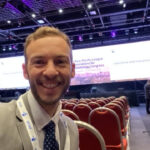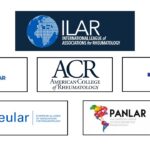Dr. Makinde agreed with these sentiments on how the program can broaden one’s perspective. She said, “You start to see how much of what we consider standard is actually shaped by the system we’re [working] in. Hearing how others manage care with different resources or collaborate across disciplines made me rethink how I approach both research design and mentorship. And it pushed me to be more intentional about what questions I ask and how I train the next generation of scientists.”
As a clinician educator, Dr. Hong felt that the program was eye-opening. “In teaching, exposure to global perspectives helps me incorporate a more inclusive and comparative framework,” she said. “I can better prepare trainees to think globally and appreciate that medicine isn’t practiced in a vacuum. It’s shaped by social, economic and systemic factors that vary widely.”
She also said that interactions like the ones she took part in at EULAR overall foster “humility, creativity and adaptability—qualities that are essential in delivering thoughtful, evidence-based and patient-centered care.”
It is important to note that not all the participants in the Exchange Program are involved in clinical care—some, such as Dr. Makinde, are basic and translational science researchers. Although she does not see patients as a clinician, Dr. Makinde told me she is always thinking about how her work connects back to patients.
“The sessions absolutely felt relevant, especially the ones that bridged molecular findings with clinical outcomes,” she said. “It was encouraging to see how many talks emphasized real-world impact, and it gave me new ideas for how to keep patient relevance front and center in my own research.”

The Venetian Towers (right) and the Monumental Fountain (left) in Plaça d’Espanya, Barcelona
Reasons to Participate
If the EULAR/ACR/APLAR Research Exchange Program sounds enticing, the application process is really just a mouse-click away. The online application for next year will be live in early 2026. Potential applicants can also reach out to Jennifer Eastin at [email protected] for more information.
Dr. Anwardeen wholeheartedly encourages any early-career rheumatologist to apply to the Exchange Program. In his view, it is more than just an academic opportunity—it’s a journey of professional growth, cultural exchange and lasting friendships.
“My advice is to be open, curious and proactive—it’s a rare opportunity that will shape your career in ways you might not yet imagine,” he says.


